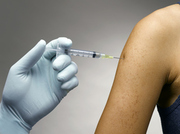 Photo: Getty Images
Photo: Getty Images
In a perfect world, women who are planning a pregnancy should be fully immunized before becoming pregnant. During pregnancy, being fully vaccinated protects your baby against serious illnesses like chicken pox and German measles (rubella).
The American Academy of Pediatrics (AAP) recommends pregnant women should only receive vaccines if:
• The vaccine is not deemed harmful to pregnant women and their babies
• Exposure to disease risk for mother and baby is high
Medical experts agree vaccines which contain live viruses should not be administered or recommended to pregnant women. According to the Centers for Disease Control and Prevention (CDC) the following live virus vaccines are not recommended during pregnancy:
• Nasal spray flu vaccine
• Human papillomavirus (HPV)
• Measles
• Mumps
• Rubella (German measles)
• MMR (combined measles, mumps and rubella vaccine)
• Varicella (chickenpox)
• BCG (tuberculosis)
Also, medical experts suggest waiting more than one month after receiving any of the above vaccinations if you want to become pregnant. If you become pregnant within 4 weeks after receiving any of the above vaccines, contact your medical professional immediately about the possible effects on the fetus.
The flu vaccine is the only vaccine recommended during pregnancy.
According to CDC, women past their second trimester of pregnancy are at increased risk for complications and even hospitalization from influenza. The CDC recommends women beyond the 14th week of pregnancy receive a flu vaccine during flu season. The flu season, from November through March, is the best time to receive a flu shot. One recent study of the flu vaccine on more than 2,000 pregnant women showed no adverse effects to the fetus. In another study, 252 pregnant women who received the flu vaccine within six months of delivery also showed no adverse effects to the fetus.
All medical experts agree that pregnant women should not receive the nasal spray flu vaccine.
After pregnancy, the CDC recommends the rubella and chickenpox vaccine to protect yourself in future pregnancies. Also, medical experts recommend the Tdap vaccine after delivery. The Tdap vaccine prevents you and protects your newborn from whooping cough. Recently, there has been an outbreak of whooping cough in the U.S., resulting in the deaths of many newborns. Newborns are very susceptible to whooping cough and its complications.
If you are planning on becoming pregnant, discus with your health care professional which vaccines you need before becoming pregnant.
Sources:
http://www.healthychildren.org/English/safety-prevention/immunizations/pages/Immunizations-During-Pregnancy.aspx
http://www.cdc.gov/vaccines/pubs/preg-guide.htm
http://www.marchofdimes.com/pregnancy/prenatalcare_vaccinations.html




Add a CommentComments
There are no comments yet. Be the first one and get the conversation started!